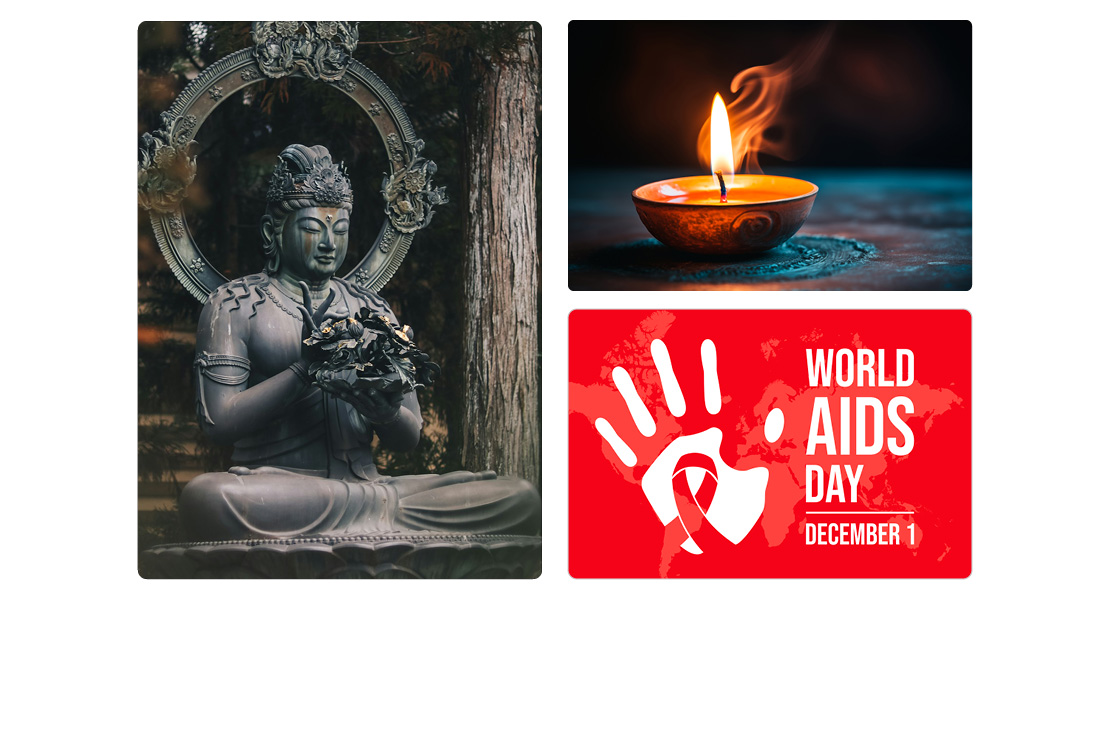December Observances and Events
We'd like to highlight several holidays and observances throughout December to recognize TGen's diversity of cultures and expressions. Please let us know if we’ve missed any so we can include your observance suggestion for 2025.
World Aids Day | Sunday, December 1
World AIDS Day is a time to honor those affected by HIV/AIDS and to advocate for equitable access to prevention, treatment, and care for all. From a DEI perspective, it’s essential to address the stigma and health disparities that disproportionately affect marginalized communities, working toward a world where everyone has the resources and support needed to live healthy lives.
First Day of Advent | Sunday, December 1
Advent, traditionally a season of anticipation and reflection, offers a meaningful opportunity to foster inclusivity and respect across diverse beliefs and traditions. By embracing Advent’s hope, compassion, and renewal themes, we can encourage unity and shared understanding within our communities during this holiday season.
International Day of Persons with Disabilities | Tuesday, December 3
International Day of Persons with Disabilities is dedicated to promoting the rights, well-being, and inclusion of people with disabilities worldwide. This day reminds us of the importance of creating equitable opportunities and accessible environments that empower everyone to reach their full potential. Let’s foster a community where all abilities are respected, valued, and celebrated.
Giving Tuesday | Tuesday, December 3
Giving Tuesday is a global day of generosity that occurs annually on the Tuesday after Thanksgiving, following Black Friday and Cyber Monday. Created in 2012, it encourages people to support nonprofits, charities, and causes they care about by donating, volunteering, or simply giving back meaningfully.
Bodhi Day | Sunday, December 8
Many Buddhists celebrate Bodhi Day on December 8th. It commemorates the day Siddhartha Gautama, known as the Buddha, attained enlightenment under the Bodhi tree. This day marks his discovery of the path to overcoming suffering and achieving inner peace, which became the foundation of Buddhism. Bodhi Day is often observed with meditation, chanting, and acts of kindness, symbolizing a commitment to wisdom, compassion, and mindfulness.
International Human Rights Day | Tuesday, December 10
International Human Rights Day commemorates the United Nations' adoption of the Universal Declaration of Human Rights in 1948. This landmark document sets out fundamental rights and freedoms that belong to all people, regardless of nationality, race, gender, or religion. Human Rights Day highlights the importance of protecting these rights and calls for global action to address inequalities, advocate for justice, and ensure everyone can live with dignity and respect.
Las Posadas | Monday, December 16 - Tuesday, December 24
Las Posadas is a traditional Mexican celebration commemorating Mary and Joseph's journey to Bethlehem and their search for shelter before the birth of Jesus. The name "Las Posadas" means "The Inns" or "The Shelters," symbolizing the places where Mary and Joseph sought refuge. Each night, communities and families reenact this journey by processing from house to house, singing songs, and often carrying candles. Hosts open their doors to "pilgrims," offering food, drinks, and festivities. Las Posadas is a joyful celebration marked by music, prayer, and community. It is a way to connect with the story of the Nativity and the spirit of hospitality and generosity.
Christmas | Wednesday, December 25
Christmas, celebrated on December 25th, began as a Christian holiday marking the birth of Jesus Christ but has roots in older winter solstice festivals. Over centuries, it has evolved into a global celebration, blending religious and secular traditions such as gift-giving, festive decorations, and gatherings. Today, Christmas represents a time of joy, generosity, and togetherness, observed in diverse ways worldwide.
Hanukkah Begins | Sunset, Wednesday, December 25 - Thursday, January 2
Hanukkah, the Festival of Lights, is an eight-day Jewish celebration marking the rededication of the Second Temple and the miracle of a single day's oil lasting eight days. Each night, families light the menorah, say blessings, and enjoy traditions like playing dreidel, exchanging gifts, and eating foods fried in oil. Hanukkah symbolizes resilience, faith, and hope.
Kwanzaa Begins | Thursday, December 26 - Wednesday, January 1
Kwanzaa is a week-long celebration honoring African heritage, unity, and culture. Created in 1966 by Dr. Maulana Karenga, it emphasizes seven principles, or "Nguzo Saba," which include unity, self-determination, collective work and responsibility, cooperative economics, purpose, creativity, and faith. Each night, families light a candle on the kinara (candleholder) and reflect on one of the principles. Kwanzaa is marked by music, dance, storytelling, and sharing a feast, celebrating African cultural roots and the values of community and togetherness.

